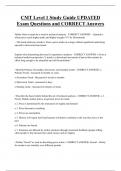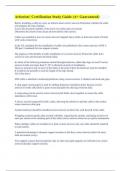CMT Level 1 Study Guide UPDATED
Exam Questions and CORRECT Answers
Define what is meant by a trend in technical analysis - CORRECT ANSWER- - Uptrend is
when prices reach higher peaks and higher troughs (VV for Downtrend)
- Flat trend (sideways trend) is when a price trades in a range without significant underlying
upward or downward movement
Explain why determining the trend is important to analysts - CORRECT ANSWER- o From a
technical analysts perspective "a trend is a directional movement of prices that remains in
effect long enough to be identified and still be profitable."
• Identify Primary, Secondary, short-term, and intraday trends - CORRECT ANSWER- o
Primary Trend - measured in months or years
o Secondary Trend - Measured in weeks or months
o Short-term Trend - measured in days
o Intraday trend - measured in minutes or hours
• Describe the basic beliefs behind the art of technical analysis - CORRECT ANSWER- o 1.
Freely Traded, market prices, in general, travel in trends
o 2. Price is determined by the interaction of supply and demand
o 3. Price discounts everything
o 4. Prices are nonrandom
o 5. History will repeat itself and humans will behave similarly to the way they have in the
past
o 6. Patterns are fractal
o 7. Emotions are affected by earlier emotions through emotional feedback (people telling
other people to buy because they made money and are happy)
• Define "fractal" as used in describing price action - CORRECT ANSWER- Fractal - Ability
for trends to act similarly over different periods
,• Describe the history of Dow Theory - CORRECT ANSWER- o Charles Dow started it.
Made an index to measure overall price movement in U.S. stocks. He died. Journalist coined
"Dow Theory." Friend took over and attempted to beat Market. People analyzed it and
determined he failed. Later on, more people analyzed it and determined he beat it according
to risk adjustment and timing market.
• Discuss the basic principles of Dow Theory - CORRECT ANSWER- o 1. Ideal Market
picture consists of an uptrend, top, downtrend, and bottom, interspersed with retracements
and consolidations.
o 2. Economic rationale should be used to explain stock market action
o 3. Prices trend
• Identify the three basic types of trend identified in Dow Theory as defined by time: primary,
secondary and minor (Refer to pg 20 for picture) - CORRECT ANSWER- o Primary - Can be
several years, longest of the three, represents the overall broad long-term movement of
security prices.
o Secondary - intermediate trend that runs counter to the primary. Generally last a few weeks
to a few months. Price movement generally retraces from 33% to 66% of the primary price
change.
o Minor - Check pg. 21 for clarity - A line is two to three weeks of horizontal price movement
in an average within a 5% range.
• Describe the "ideal market picture" according to Dow Theory - CORRECT ANSWER- o
consists of an uptrend, top, downtrend, and bottom, interspersed with retracements and
consolidations (Ex. On P. 18)
• Express the concept of confirmation in Dow Theory - CORRECT ANSWER- o In Dow's
time, confirmation was the consideration of the Industrial Average and Railroad Average
together. Example is when there is a primary bullmarket but the secondary trend fails to make
a new high (i.e. turn back into a primary). Could be a warning that the primary is going to
Bull Market (a non-confirmation). In today's day, Confirmation is usually confirmed between
the S&P500 and Russell 2000.
• Explain the role of volume in Dow Theory - CORRECT ANSWER- o Volume cannot itself
signal a trend reversal, but it is an important secondary confirmation of a trend. However,
price trend and confirmation overrode any consideration of volume.
,• List advantages of reviewing price information in chart format - CORRECT ANSWER- o 1.
Provide price history
o 2. Provide good sense of Market's volatility
o 3. Useful for the fundamental analyst - Analyst can find big price move on chart, determine
what fundamentals were changed at this time, and then construct a price behavioral model
o 4. Serve as a timing tool for those who base their decisions on other info
o 5. Used as a money management tool by defining meaningful stop points
o 6. Reflects market behavior that is subject to certain repetitive patterns
• Review the data points required to construct the line, bar, and candlestick charts -
CORRECT ANSWER- o Line - Price and Time
o Bar - High, low, and closing price for each time interval (some contain the opening price, as
well)
o Candlestick - High, Low, Closing, and Opening,
• Describe how to construct line, bar, and candlestick charts - CORRECT ANSWER- o Line -
Price data is on the vertical axis, time data is on the horizontal
o Bar - Each bar represents a certain time period (for example one bar may represent one day
of data). Price is on the vertical and time is on the horizontal
o Candlestick - Low and High prices are plotted on a thin bar and a box represents opening
and closing prices. Box is called the Real Body; if the security closed at a higher price than it
opened, the body is white or open; VV = black or closed.
• Explain the differences between arithmetic and logarithmic scales and their uses -
CORRECT ANSWER- o Arithmetic shows price units at the same price intervals ($1 - $2
movement looks same as $100 - $101 movement)
o Log Scale - Represents the same percentage price (I.e. $1 - $2 movement is much greater
than a $100 - $101 Movement)
o Rule of thumb: When a security's price range is greater than 20% a log scale is more
accurate and useful.
• Difference between the high and low of a bar is the - CORRECT ANSWER- Range
, • Explain why trend identification is important to achieve profits - CORRECT ANSWER- o
(Besides the obvious of without identifying a trend you won't be able to ride the trend and
make money)
1. Determine, with min. risk of error, when a trend has begun at its earliest time and price
2. Select and enter a position in the trend that is appropriate to the existing trend
3. Close those positions when the trend is ending
• Recognize an uptrend, a downtrend, and a trading range - CORRECT ANSWER- o Uptrend
- peaks tend to be higher than earlier peaks, and the troughs tend to be higher than the
previous troughs
o Downtrend - VV
o Trading range - Peaks and troughs are scattered, the trend is undeterminable, and if the
peaks and troughs occur at the same relative levels
• Describe the concept of support and resistance - CORRECT ANSWER- o Support and
resistance points are a single peak or trough; zones are multiple points
o Believed to occur due to human reactions
• Identify trends using most common methods - CORRECT ANSWER- o Using a regression
line
o Using a trend line
Need two support reversal points or VV
o Scale and Trend Lines
Shorter time frame uses algorithmic; longer uses logarithmic
o Accelerating Trend Lines (pg. 66)
o Decelerating Trend Lines (pg.66)
• Recall how significant reversal points are identified - CORRECT ANSWER- o DeMark or
Williams Method
A bar with a low that is surrounded by two bars with higher lows (VV for resistance)
o Percentage Method
Deciding on a percentage to use. In determining a trough - any time the price declines more
than 1%, makes a low, then rallies up 1%, would define a trough (VV for Peak). The larger
the percentage used the more important but less frequent the reversal point





